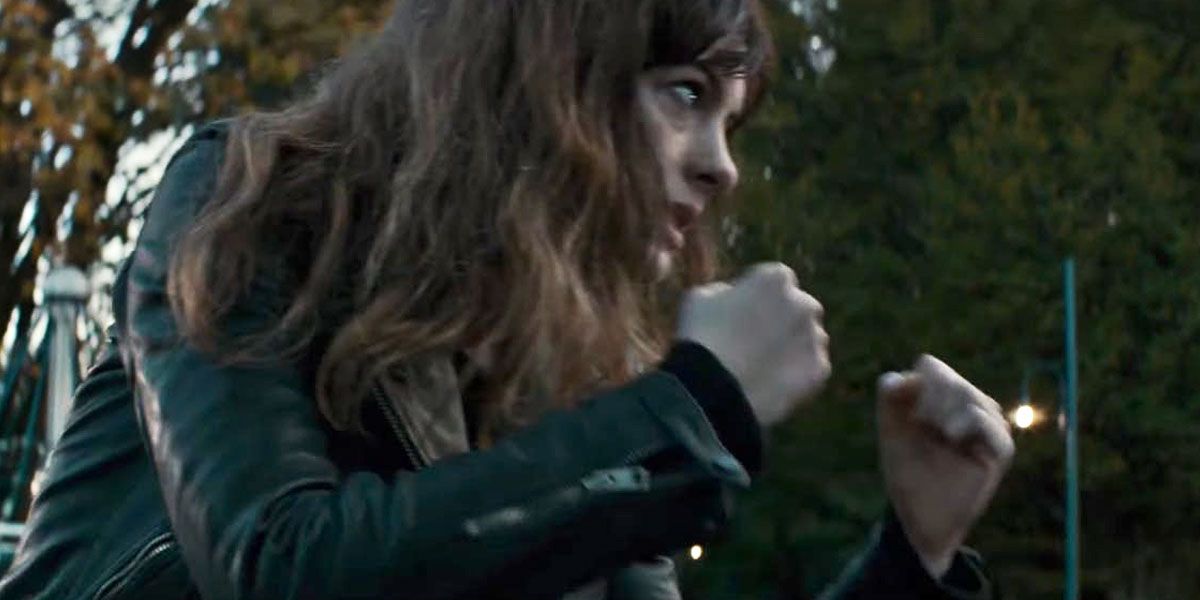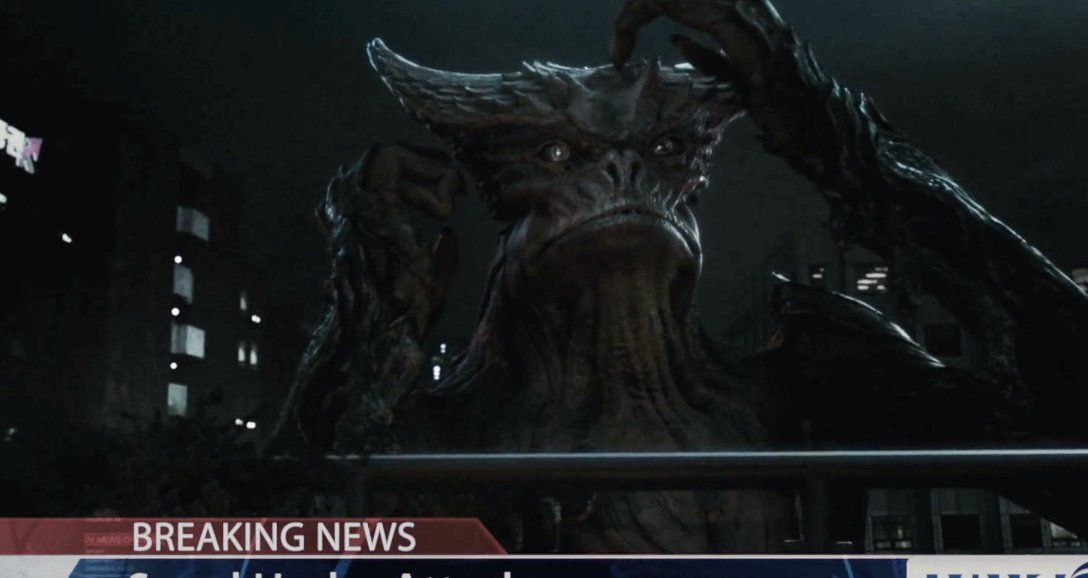SPOILER WARNING: The following article contains major spoilers for "Colossal," in theaters now.
A movie called "Colossal" came out this month, but despite starring Anne Hathaway and Jason Sudeikis, you wouldn’t be alone if you hadn’t heard of it.
Written and directed by Nacho Vigalondo ("Time Crimes," "Open Windows"), the film has all the makings of an off-beat indie hit: a quirky premise, genre nonconformity and a protagonist in some form of arrested development. Many critics, including CBR's Kristy Puchko, have praised “Colossal” for its use of genre, mainly how it smashes them like a kaiju set loose on Tokyo. It subverts the low key rom-com as effortlessly as it plays off its horror film/ Japanese monster movie predecessors.
REVIEW: Anne Hathaway Crafts Killer Kaiju Comedy With Colossal
There's much about the way “Colossal” adapts pieces of other genres that deserves praise, but what I was struck with was how it well it played as a genuine superhero movie. In a year that’s already given us “Logan” and has “Guardians of the Galaxy Vol.2” around the corner, it could easily join the ranks of unexpected super powerful delights.
The Non-Heroic, Pre-Superpower Life
Many heroes are unlikely ones. Peter Parker is a dweeby teenager, Clark Kent a mild- mannered reporter. In "Colossal," Hathaway's Gloria is an unemployed alcoholic who gets dumped by her long-suffering boyfriend (Dan Stevens). Kicked out of her New York apartment, Gloria is forced to return to her small childhood town and her dusty childhood home, long ago abandoned by her parents.
When her childhood best friend Oscar (Jason Sudeikis) finds her, she’s dragging an air mattress down the street in yesterday’s clothes and makeup. He invites Gloria to the bar left to him by his deceased father, and eventually offers her a part-time job. Perhaps this will be a nice tale about two old friends becoming "something more," and maybe even learning something from one another.
The Superpower Discovery Moment
Psych! It turns out Gloria is also a Godzilla-like monster that’s been terrorizing Seoul, Korea. Rather, the monster appears to imitate her exactly, as we see when it scratches the top of its head per her own nervous tick.
While your average summer blockbuster usually has some fun when a character discovers they have powers, the whimsy here is completely undercut by dread. By the time Gloria realizes she controls the kaiju, it’s already killed hundreds of people, as during the first instances of its appearance, Gloria was drunkenly stumbling home from the bar, making the blame even more acute.
While this takes a toll on Gloria, it doesn’t stop her from staying late after the bar’s closed to drink with Oscar and their friends. Inevitably, she drunkenly shows them what she can do, and, inevitably, she falls over, thus making the Korea-based kaiju fall onto a building filled with people.
Though neither the fate of the galaxy, planet or anything beyond the shoreline of Seoul is at risk in the movie, Gloria and the audience are always painfully aware of the stakes. Gloria’s slow revelation that she is the one responsible for the deaths in Seoul comes to her with horror film theatrics. She’s a monster, literally, learning that with great power indeed comes great responsibility. Her behavior has to change, otherwise people will die.
Mythology
Eventually, Gloria is able to figure out that the monster only appears for a few-minute window, and only if she’s standing in the park near her house. Watching Gloria systematically figure out the rules of her strange predicament never feels dull or exposition-y. Each revelation is presented almost entirely through visuals and is always motivated by the prevention of more killings.
"Colossal" also offers its own strange origin story. Without getting into too much detail, the incident involves elementary school-aged Gloria and Oscar looking for a diorama she made for school. Oscar finds it in the woods and, thinking Gloria isn't around, smashes it, just as lightning strikes both of them. At this point, it's been revealed that Oscar also materializes in Korea -- only he's a giant robot. The point of this twist isn't to create bulletproof logic -- the film isn't interested in that. Every element of the story is in service to the characters.
An Actually Good Supervillain
Which brings us to Oscar. He’s first set up as a potential love interest- not necessarily because he and Gloria are interested in each other romantically, but because of what we’re conditioned to think from other movies, it would make sense. He’s the male lead, her attractive and available friend, they seem to get along, they’ll probably get married.
With the revelation that he too can materialize in Seoul, Oscar’s own demons take root. Thanks to the film's focus on Gloria and her struggle, it's easy to miss the signs that Oscar is just as much of an alcoholic. This isn’t a movie where Oscar shows his long-lost friend the charm of small town living; it’s a movie where Oscar's resentment toward himself and jealousy toward Gloria drives him to the extreme.
Realizing that he can appear as a giant robot and that millions now watch "him," Oscar falls in love with his own celebrity. For once in his life, he matters, and he makes it clear to Gloria that he's not interested in letting that end -- for either of them. He becomes darkly dependent, even possessive of her in a way not dissimilar to the Joker and Batman. He needs her to play the hero to his villain, and if she doesn't, he'll continue to be a villain on his own. His motivation and relationship with Gloria becomes legitimately disturbing and not easily categorized, giving us audiences we so rarely get, even in the best comic book movies: a villain's arc that’s both empathetic and meaningful.
When Gloria remembers the moment when Oscar smashed her project, she isn’t struck by the explanation of their abilities. Looking back at Oscar, her once friend, now captor, she has a different revelation: “You hate yourself, don’t you?” If the audience is reluctant to believe how dark Oscar has turned at this point, it's apparent in the knock down, drag out brawl that follows, a fight that results in him spitefully crushing more of Seoul right before her eyes.
A Final Fight That Has Purpose and Meaning
The final battle that's less a climactic brawl than a closing statement on each character. Once Oscar's made it evident that he's willing to kill in service of his own ego, Gloria travels to Seoul and goes to the spot she knows the giant robot will materialize. Oscar is indeed at the park, but as he begins to walk forward he's met by an unexpected force: the giant kaiju. Oscar is, quite literally, confronted with the consequences of his actions.
Every great hero story is about overcoming not only a literal villain, but the personal constraints the hero has to comply with. Captain America is haunted by a past life cut short, Superman will always feel like an outsider to the people he devotes his life to, Bruce Wayne must decide if he dons the cape for Gotham or himself.
The best villains reflect our heroes’ struggles while still having a story and identity of their own. Oscar and Gloria are dogged by similar demons; both are dissatisfied with what their narratives have become, and both mask the dissatisfaction by drinking. By setting up Gloria and Oscar as parallels before their arcs diverge, "Colossal" makes an interesting statement on the difference between heroes and villains: We're all capable of destruction, so maybe the difference is as simple as changing when confronted with wreckage left in your wake.



